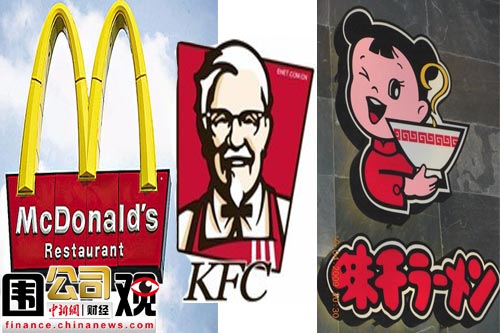(Ecns.cn)--Over the past few years, food safety problems have become the focus of Chinese media. Foreign fast food restaurants, which entered China in the 1980s and were trusted by many Chinese consumers, have recently been found to not be as safe as their "convenient, clean, fast" mottoes claimed.
This summer, several popular foreign fast food chains, including Ajisen Ramen, McDonald's, and Kentucky Fried Chicken (KFC), were all entrapped in food scandals. People wondered why these global famous food giants changed their "tastes" and practices in China's market.
Ajisen Ramen 'pulls a fast one' on customers
Ajisen Ramen, one of the country's largest fast food restaurant chains selling Japanese ramen noodle soup dishes, stirred Chinese consumers' anger after reports claimed that it used cheap powders and other instant seasoning for its noodle soup base, instead of what it claimed to be actual pork bones.
Its advertisementa were so attractive: the soup was made by boiling pig bones for more than 20 hours, and each bowl of soup contained high calcium contents up to 1,600 milligrams, which is four times that of milk and ten times that of meat.
However, it was proven that the soup, which was blended with concentrates and flavoring powders, only contains 48.5 milligrams of calcium in each bowl, according to a test done by the College of Food Science and Nutritional Engineering at China Agricultural University (CAU).
Ajisen has fumbled to come up with an explanation. "This is indeed a case of deceptive advertising," Fan Zhihong, an associate professor at CAU who attended the Ajisen soup base test, told the Beijing News.
Ajisen (China) Holdings Limited, founded in 1996, is the sole franchisee of Japan's Ajisen-branded restaurant chain on China's mainland and in Hong Kong. The company now has 585 stores across the country and was listed on the Hong Kong Stock Exchange in March 2007.
The food chain operator also claimed that the company was recommended by China Agricultural University. The statement was denied by CAU, which said in an announcement on its website that it has nothing to do with any Ajisen product certification or recommendation, nor has it ever provided advisory and consulting services to the company.
After the scandal was exposed, the company's stock suffered its biggest slump since October 2008 on August 2, causing a loss of more than HK$4 billion.
KFC criticized for powdered soy milk
In addition to Ajisen Ramen, KFC in China was also criticized for cheating customers with its powdered soy milk.
The fast food giant, which tried to adjust to the local environment and provide several kinds of local foods, including soy milk, rice, and youtiao (Chinese oil stick), admitted on July 29 that its soybean milk was made from liquid concentrate or powder, after an Internet user posted a picture of boxes of soybean powder piled outside one of the chain's Beijing restaurants on his personal microblog.
A KFC spokesman confirmed that most of its restaurants in Beijing used liquid concentrate to make the soybean milk while those in other cities and regions, including Shanghai, used powders.
Though the company had never claimed that its soy milk was freshly ground in the kitchen, domestic consumers still expressed their anger. A customer who said he ordered soybean milk every time he visited the restaurant said: "I thought it was freshly made because it is not sold for a cheap price. But now it turns out it's not worth it."
Meanwhile, customers also felt they were overcharged. "Even soybean milk sold at street food stalls is freshly boiled. Such expensive soybean milk at KFC was a mixture of water and powder?" one consumer wrote in an online post. A reporter from Beijing Times said a cup of soybean milk made with soybean powder cost about 0.7 yuan ($0.11), but was sold by KFC at 5.5 yuan for a hot drink, and 6.5 yuan for a cold drink. In comparison, a cup of soybean milk made from ground soybeans, the common method of preparing it, was sold for no more than 1.5 yuan by street vendors.
According to an industry insider, freshly produced soy milk usually tastes better than that made from powder or concentrate and it costs more because restaurants need extra staff to make it and they have to be trained to do so.


















